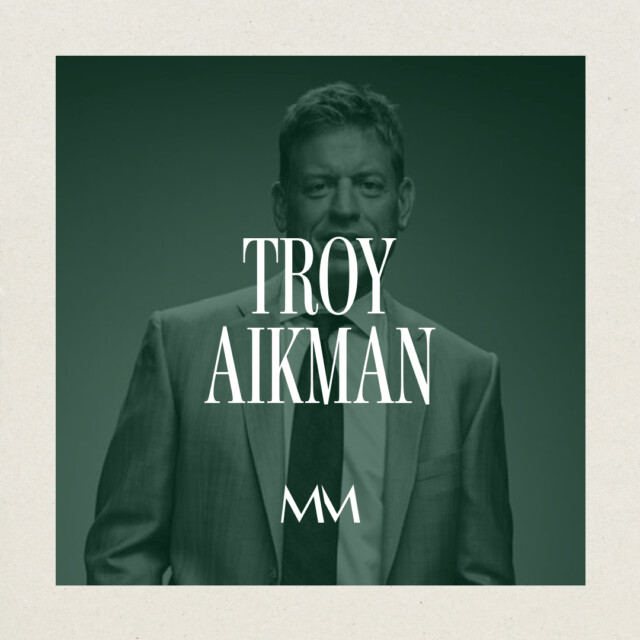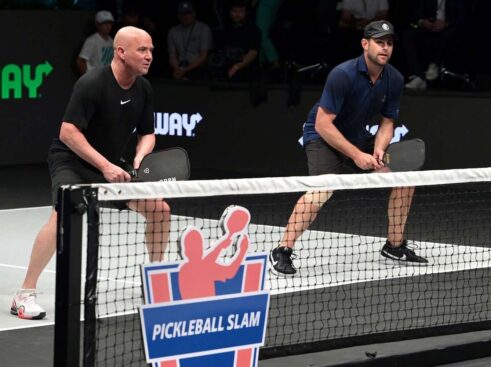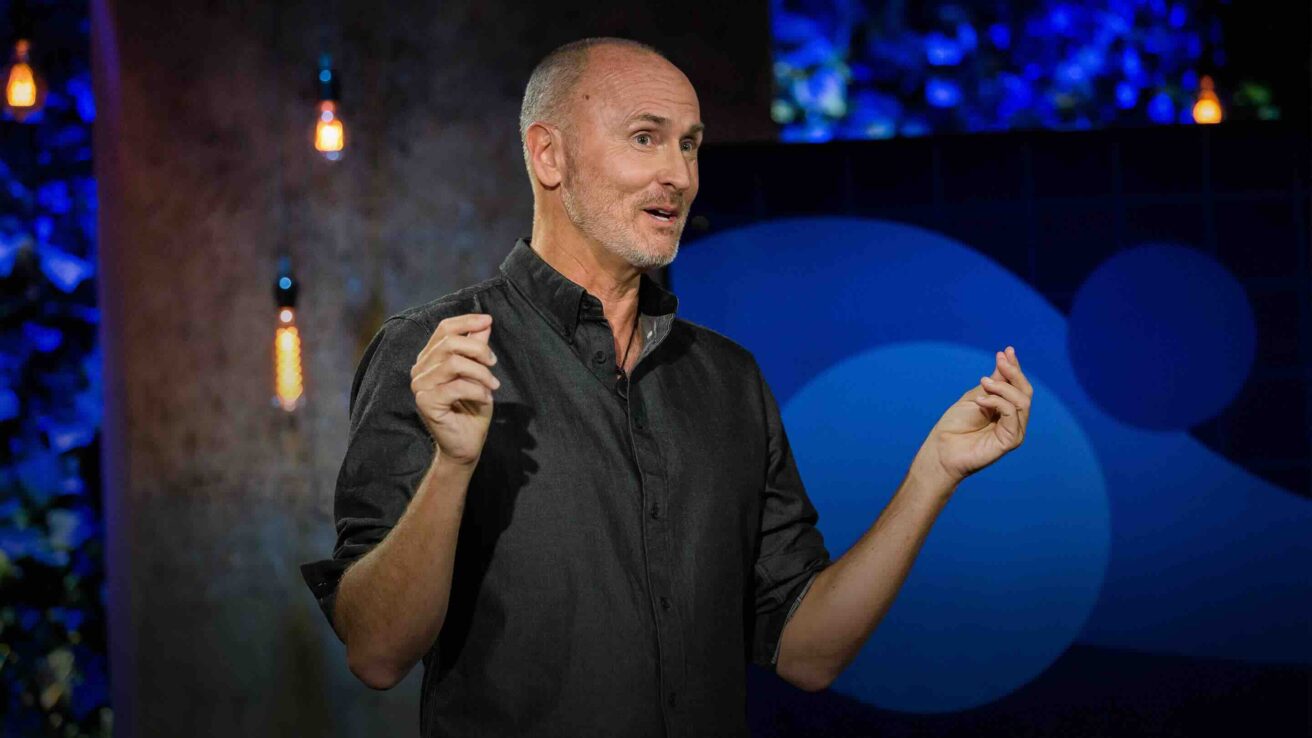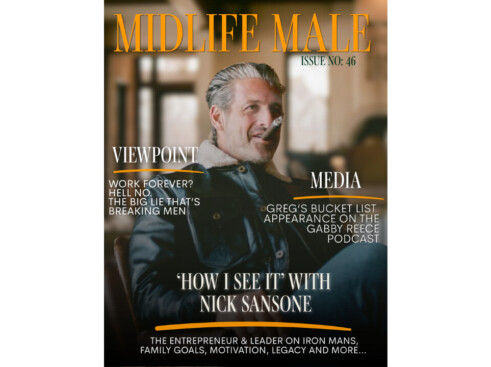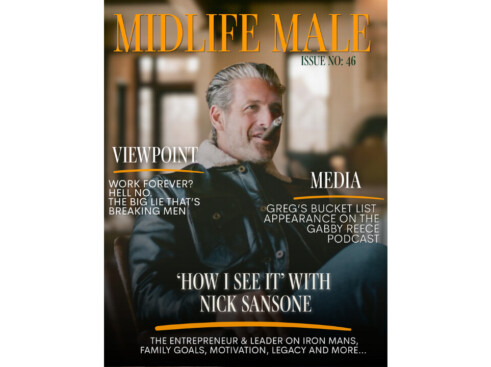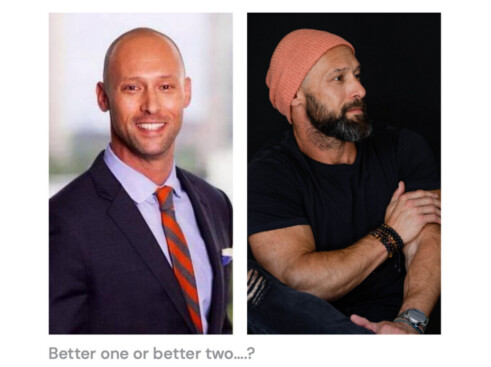I have a confession to make: I often struggle with being open-minded and accepting of other people’s viewpoints. It’s a lifelong thing. I know I can be a stubborn guy, which is one of the reasons we named this series ‘How I See It,’ because I think it is so important to understand, embrace, and learn from how other men see things and the manners in which they have navigated and grown throughout their lives.
Chip Conley is one of those men. He’s a guy who I normally wouldn’t gravitate towards because it’s harder for me to seek out the sensitive, the empathetic, the learners, the softer side of strength – the mental, emotional, and spiritual side of strength. These are the muscles that don’t always get enough reps and are not often enough a priority for me.
I’m rarely in awe of another man’s physical strength. Sure, a big lift or feat is impressive, but I understand it. I know exactly what it takes to develop physical strength, to move heavy things. I understand that purpose, the process, and ultimately, the payoff.
But what I truly marvel at is men like Chip Conley—men who are very different from me, who have a different kind of strength, grit, and perseverance, and an incredible entrepreneurial spirit. Men who battle cancer and win. Men who create businesses of tremendous value. Men who lift others up and build real community, connection, and collaboration. Chip is one of those men.
The way Chip lives and what he represents is in many ways the opposite of how I was raised and what I’ve traditionally thought of as strength or masculinity. He’s the kind of guy who speaks openly about transformation, about becoming a “modern elder,” and even uses imagery like chrysalis and butterflies—stuff that I used to cringe at because it felt like the antithesis of traditional strength. But I have the utmost respect for men like him who so freely, securely, and beautifully spread messages of positivity and build magical places like Modern Elder Academy, impacting how thousands of people see, function, and thrive in middle age.
Getting to know Chip, having him on the podcast, and spending time at the Modern Elder Academy, was one of my favorite experiences—getting out of my comfort zone and coming out better on the other side. I believe the word they used to describe me at graduation was “softening”. Watching how Chip has developed himself as a modern elder, how he lives, leads, loves, and guides by example, has broadened my perspective on what true strength and growth can look like; which is the definition of maximizing middle age.
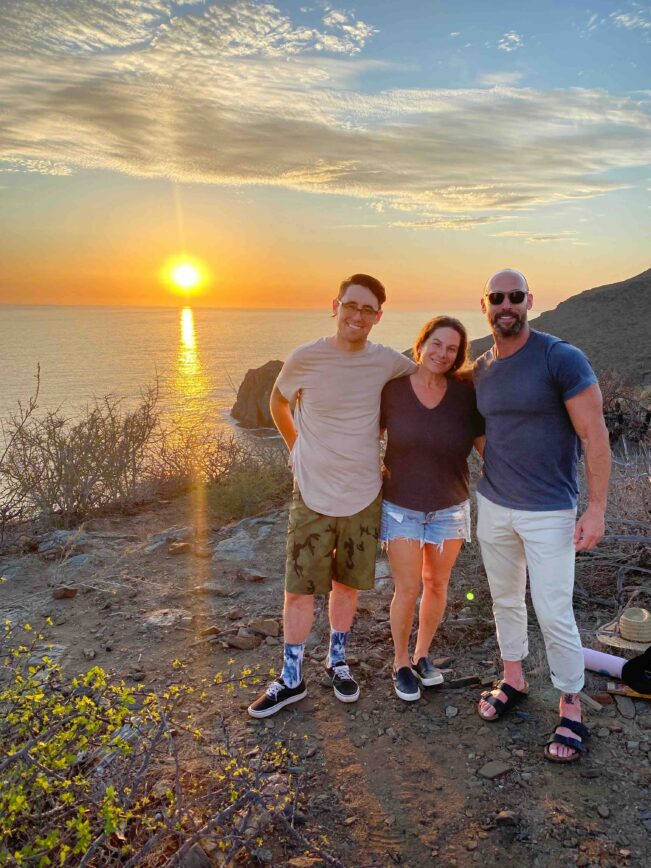
Chip’s journey is a testament to resilience, reinvention, and the strength found in vulnerability and community. For those of us navigating this stage of life, his perspective can be both challenging and deeply inspiring. This isn’t just about self-improvement; it’s about embracing a more connected, purpose-driven approach to aging that defies traditional boundaries of strength and success. Please enjoy this ‘How I See It’ interview. I think you’ll come away with a fresh sense of what’s possible for yourself, your relationships, and your future, just like I did.
– Greg
How I See It with Chip Conley
MLM: I first heard about the Modern Elder Academy through a post by Tim Parr from Caddis about his experience at one of your retreats in Baja. I looked into it and your incredible backstory, and I was blown away. This concept feels groundbreaking. What led you to create the Modern Elder Academy?
Chip Conley: It’s really a two-part story. I started a boutique hotel company, Joie de Vivre, at 26 and grew it into the second-largest boutique hotel company in the U.S., with 52 hotels in California. I loved it for 22 years, but by 47, I was burned out. The Great Recession hit, and during that time, I tragically lost five male friends in midlife to suicide. I hit my own dark night of the soul and even had a near-death experience (NDE) when I flatlined nine times due to complications from an allergic reaction.
I sold my company at the bottom of the market, and as I rebuilt my life, I began reflecting on how challenging midlife is for so many. Two years later, I joined Airbnb as their “modern elder.” At 52, I was twice the age of most employees. Initially, I resisted the title, but when they described a modern elder as someone “as curious as they are wise,” I embraced it.
While writing my book Wisdom at Work: The Making of a Modern Elder at my home in Baja, I had what I call a “Baja Aha.” I realized we lacked spaces where people could reimagine and repurpose themselves in midlife. I wished something like this had existed for my friends who took their lives—and for me during my low point. In 2018, we opened the Modern Elder Academy in Baja, and since then, it’s grown to include locations in New Mexico, a regenerative residential community, and online offerings.
MLM: When you decided to launch the Modern Elder Academy, did anyone question your decision?
Chip Conley: Oh, absolutely! I had people asking, “Chip, have you thought this through? Why invest in this?” My mother had similar questions. So, before officially launching, we ran 13 beta workshops in 2018, hosting about 160 people in Baja for free. The response was overwhelmingly positive. Participants felt a deep need to reframe their relationship with aging.
One key piece of research that reinforced this came from Dr. Becca Levy’s book Breaking the Age Code. She found that shifting from a negative to a positive view of aging can add 7.5 years to your life. It’s not just about living longer—it’s about thriving. Participants in our beta program even asked for an alumni network, which validated the program’s impact and led us to open to the public.
MLM: I love your approach to reframing aging. I’ve always rejected the term “anti-aging.” Aging is a privilege. How do you help people embrace this perspective?
Chip Conley: I agree completely. Aging isn’t something to fight against; it’s something to optimize. The societal narrative often links midlife with decline—disease, decrepitude, and death. But research shows that happiness actually increases after 47, which is often the low point on the “U-curve of happiness.”
At MEA, we focus on shifting from a fixed mindset to a growth mindset about aging. We teach participants how to navigate midlife transitions and embrace regeneration. Instead of retiring to a “retirement community,” we advocate for “regenerative communities,” where people can continue growing, learning, and contributing.
MLM: What do you see as the main differences in how men and women experience midlife?
Chip Conley: Women often focus on physical changes, like menopause or societal pressures around aging. Men, on the other hand, tend to define themselves by their careers. Many men feel the sting of workplace ageism in their 50s, which can erode their confidence.
Men also struggle with emotional isolation. Women generally have stronger social support networks, while men often lack the same outlets for vulnerability. This can lead to what I call the “quiet desperation” that’s so common in midlife.
At MEA, we create a safe space where men can open up emotionally. It’s powerful to watch men receive positive feedback for being vulnerable—something many have spent their lives avoiding. They leave our workshops more emotionally fluent, which improves their relationships at home and helps them thrive in the second half of life.
MLM: You’ve created something truly transformative. What do you want people to take away from the Modern Elder Academy experience?
Chip Conley: I want people to see midlife not as a crisis but as a calling. Mary Catherine Bateson said it best: With longer lifespans, we’re not just adding years to the end of our lives; we’re expanding the middle. This gives us a chance to reflect, recalibrate, and set a new course.
At MEA, we call it creating a “midlife atrium”—a space for light, air, and deeper questions. If you’re 54 and expect to live to 90, you’re only halfway through your adult life. That’s a profound realization. Midlife is the perfect time to ask, “What’s next?” and embrace the possibilities ahead.
MLM: You touched on something really powerful—the idea of creating space to “unravel,” as Brene Brown puts it. I love how you’ve embraced that concept at the Modern Elder Academy. Can you elaborate on the symbolism and exercises you use to help people let go and reset?
Chip Conley: Absolutely. Brene is a friend, and her idea of “unraveling” really resonated with me. When she said midlife is about unraveling, my first thought was, “Oh no, I don’t want to fall apart.” But then I realized that to unravel is to untangle yourself from the knots that keep you stuck. It’s freeing.
At MEA, we lean into this concept with an exercise we call the “Great Midlife Edit.” About 24 hours into our workshops, participants gather at sunset by the fire. They write down something that’s no longer serving them—a mindset, a habit, or a belief—and share it with the group before tossing it into the fire. Then, they turn to the group and declare what they’re replacing it with.
This ritual is incredibly powerful. It creates a clear before-and-after moment for participants, fostering deep connections within the group and helping them feel ready to move forward.
MLM: I love that idea of intentional reflection. It reminds me of something I try to practice—thinking about what fills my tank and what drains it. That self-awareness can be hard to cultivate in the middle of a busy life. Shifting gears a bit, you’ve gone from hospitality to tech to launching a movement around aging. How did you find your voice and decide to share it through books, blogs, and talks?
Chip Conley: It’s been a journey. My background in hospitality and later at Airbnb taught me how to create meaningful experiences and lead mission-driven organizations. But as I transitioned into writing and teaching, a phrase from the developmental psychologist Erik Erikson stuck with me: “I am what survives me.”
I’d already written four books, but creating the Modern Elder Academy felt like a deeper legacy—a way to help people reframe their relationship with aging and midlife. Writing Wisdom at Work was part of that mission.
For me, writing comes from an inner calling rather than external validation. I wake up early to write, letting the words flow before my internal editor kicks in. I like to think of myself as a conduit—channeling ideas that are bigger than me. That sense of purpose also drives MEA. My background in hospitality, teaching workshops at Esalen, and my experience at Airbnb gave me the tools to bring this vision to life.
MLM: It sounds like your work is fueled by passion, but I’m curious—how has financial success played a role? Does it make following your calling easier?
Chip Conley: Financial success has certainly given me the freedom to take risks. When I sold my hotel company during the Great Recession, I made some money, but nothing life-changing. Joining Airbnb was a game-changer, though. I was fortunate to be part of the company’s early days, and when it took off, it gave me the financial security to launch MEA without relying on outside investors.
That said, money alone isn’t enough to drive what I do. At MEA, we ask participants, “What will you regret 10 years from now if you don’t do or learn it now?” That question helped me recognize that I couldn’t ignore the calling to create MEA. The memories of my five friends who took their own lives also keep me grounded. It’s about using the resources I’ve been blessed with to create something meaningful—not just for others, but for myself as well.
MLM: That perspective is so valuable. For those who might not have financial freedom, how do you think they can eliminate regret and still embrace new opportunities?
Chip Conley: I think it’s important to recognize that you don’t have to quit your job or make drastic changes to pursue growth. Small steps can be transformative. Try asking yourself, “What fills my tank, and what drains it?” Focus on the things that energize you and take incremental steps to incorporate them into your life.
At MEA, we emphasize the concept of curiosity—trying new things without pressure. Whether it’s learning a new skill, exploring a hobby, or simply creating more time for reflection, there are ways to make meaningful changes without upending your life.
MLM: Do you share this message with companies? How does your philosophy resonate in the corporate world?
Chip Conley: It depends on the company. Organizations that are focused on long-term growth and value tend to resonate with what I teach. My approach is rooted in what I call “karmic capitalism”—the idea that what goes around comes around. This means building a company culture that prioritizes employees, customers, and sustainable growth.
At Airbnb, I had the chance to demonstrate this philosophy on a global scale. When I joined, it was just a small tech startup. Today, it’s worth more than Hilton, Marriott, and Hyatt combined. That success came from focusing on people and long-term value, not just short-term profits.
Of course, not every company is open to this approach. Some are purely profit-driven, but I believe the tide is turning. There’s a growing recognition that businesses can be both successful and values-driven.
